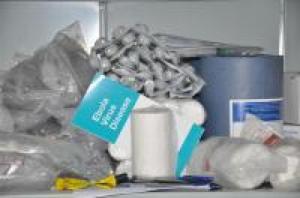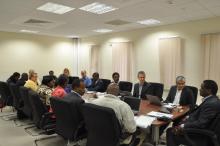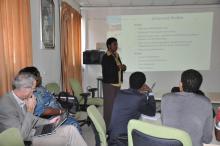Ebola Preparedness Continues in Ethiopia
The ongoing epidemic of Ebola Virus Disease (EVD) in West Africa poses considerable risk to currently unaffected countries, including Ethiopia. To support currently unaffected countries with strengthening their preparedness for an introduction of EVD, WHO and partners are accelerating Ebola preparedness activities, such as the development of a preparedness checklist outlining the key components and tasks of an Ebola response.
Addis Abba is an important regional hub with a high number of diplomatic missions in the country (the largest in Africa) and serves as the headquarters of the African Union. An external Ebola Virus Disease Preparedness Assessment was conducted in Ethiopia, 2-8 December 2014, to assist the country to effectively and safely detect, isolate, investigate, and report potential EVD cases and prevent an outbreak from occurring. To accomplish this goal, the team conducted scoping activities, stakeholder meetings, site visitations, and a table top simulation exercise to explore what systems were in place and what areas of preparedness could be focused on and strengthened. The assessment team concluded that Ethiopia’s preparedness is progressing well in line with National EVD Preparedness and Response Plan developed by the national EVD Technical Committee under the leadership of the Minister of Health in April 2014. The joint team to strengthen Ethiopia's EVD preparedness was composed of experts from Ethiopia's Federal Ministry of Health, Ethiopian Public Health Institute, WHO (Headquarters, Regional Office for Africa, Inter-country Support Teams and the country offices of Ethiopia, Ghana, and Uganda), Centers for Disease Control, UNICEF, WFP, and Public Health England.
In December 2014, the Korea International Cooperation Agency (KOICA) and the World Health Organization Country Office for Ethiopia (WCO) joined forces in the effort to heighten Ebola virus disease (EDV) preparedness in Ethiopia. KOICA’s support to WHO will contribute to strengthening the capacity of the Ethiopian health system to prepare for Ebola in line with the country’s EVD outbreak preparedness plan. The KOICA-WHO collaboration will help to ensure that health workers in Ethiopia will be adequately trained on EVD case management, surveillance and infection prevention precautions to timely detect, monitor and respond to an Ebola case if necessary. Six hundred health workers will be trained and close to 400 Personal Protective Equipment will be supplied to clinicians working with possible Ebola patients. Moreover, support to strengthen coordination and the sub-national EVD outbreak preparedness assessment will be carried out as part of the project.
As the country continues to strengthen its own preparedness, Ethiopia is also supporting the affected countries as a sign of solidarity. A total of 187 health professionals from Ethiopia left on 16 December to the three West African countries most-affected by Ebola: Liberia, Sierra Leone and Guinea. According to Ethiopia’s Minister of Health, Dr Kesetebirhan Admasu, Ethiopia is now the largest volunteer contributor to the Ebola response in Africa. The Ethiopian health professionals are from the public and private sectors and comprise medical doctors, nurses, field epidemiologists, environmental health professionals and public health specialists.
Dr Admas Tefera, Preparedness, Surveillance and Response Programme Coordinator, WHO Ethiopia; email: admast [at] who.int (admast[at]who[dot]int)
Photos: WHO Ethiopia/ Viivi Erkkila






